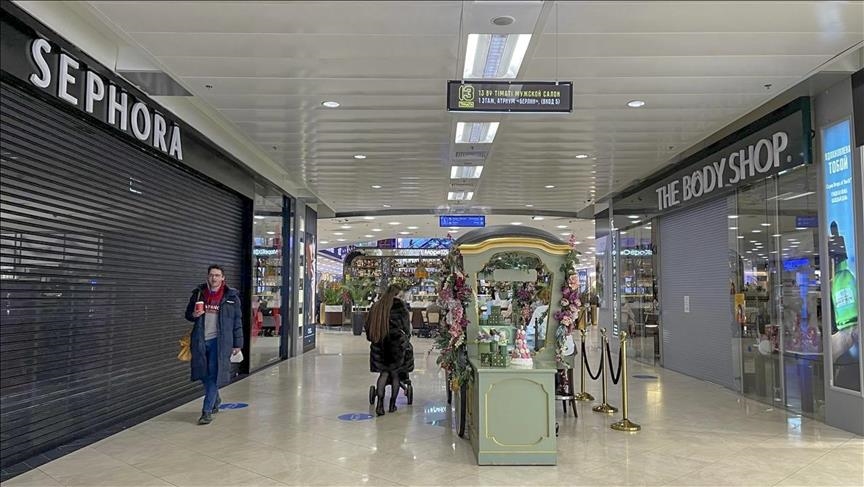

By Anadolu Agency
ISTANBUL
A new report showed that only 8.5% of EU and G7 companies had taken a step to exit from Russia or suspended their operations in the country.
According to a report released by Switzerland-based St. Gallen University on Thursday, despite sanction decisions against Russia, the companies continue their relations with this country as usual.
After Russia started what it called a “special military operation” in its neighbor on February 24, 2022, many sectors and countries announced sanctions or suspensions for trying to exert pressure on the Russian economy.
Some firms stopped their operations and deliveries in Russia, while others ended their investments or withdrew from their partnerships in Russia, even in Belarus.
The report said there were 2,405 subsidiaries owned by 1,404 EU and G7 companies as of April 2022 and only less than 9% of them were closed or sold.
“Confirmed exits by EU and G7 firms that had equity stakes in Russia account for 6.5% of total profit before tax of all the EU and G7 firms with active commercial operations in Russia for which information is available in the ORBIS database, 8.6% of tangible fixed assets, 8.6% of total assets, 10.4% of operating revenue, and 15.3% of total employees,” the report stated.
The report also showed that there are more exits by foreign firms headquartered in the US than those based in the EU and Japan; fewer than 18% of US subsidiaries have actually divested.
“Of those EU and G7 firms remaining in Russia, 19.5% are German, 12.4% are American owned, and 7% are Japanese multinational firms,” it added.
Major brands
Another data released this week by Brand Finance showed that Western companies dominated the world’s top brands list, and it was seen that several global brands suspended their operations in Russia, mostly in March.
Top global brands, excluding some Chinese firms, are not active in the Russian market due to its war on Ukraine since the last February.
There were 12 US brands among the top 25 brands, followed by China with seven, Germany with three, South Korea, Japan and the UK with one.
The world’s top brand, Amazon, suspended its Russian operations on March 9, 2022, announcing that it will not be accepting any new customers in Russia and Belarus.
Apple, taking second place in the top brand’s list, has also suspended all official sales in Russia as of March 2, 2022, and turned off selected applications and services in the country.
Google, as the third most valuable brand, suspended some services in the country in March 2022, such as the advertising and application market. Then, Russia’s communications authority blocked Google’s news services in the country, accusing the service is spreading false information about the war.
The fourth most valuable brand Microsoft suspended new sales in the country on March 4, 2022, but according to Yale University’s research, it is continuing to allow existing access in the country.
The fifth brand on the list, Walmart, already has no operations in Russia as of 2022; it had some investment plans previously, but it closed its Moscow office in 2010.
From Samsung to Starbucks, Mercedes to Disney and Shell, other top brands also announced suspensions.
While some brands were still not active in Russia even before the war, GSM firms Verizon and AT&T provided free services for Ukraine.
Chinese brands
Top Chinese brands, from Brand Finance’s list, think different when it comes to Russia.
According to Yale’s research, China’s ICBC bank curtailed Russian access to capital markets.
China-based social media platform TikTok suspended operations in Russia, while Wechat is not implementing any restrictions on Russia.
China Construction Bank and Agricultural Bank of China allowed Russian companies to open accounts with the bank.
State Grid Corporation of China and Kweichow Moutai Group’s businesses continue as usual.
We use cookies on our website to give you a better experience, improve performance, and for analytics. For more information, please see our Cookie Policy By clicking “Accept” you agree to our use of cookies.
Read More